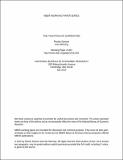The Taxation of Superstars
Author(s)
Scheuer, Florian; Werning, Ivan
Downloadw21323.pdf (462.6Kb)
OPEN_ACCESS_POLICY
Open Access Policy
Creative Commons Attribution-Noncommercial-Share Alike
Terms of use
Metadata
Show full item recordAbstract
How are optimal taxes affected by superstar phenomena? To answer this question, we extend the Mirrlees model to incorporate an assignment problem in the labor market that generates superstar effects. Perhaps surprisingly, rather than providing a rationale for higher taxes, we show that superstar effects provide a force for lower marginal taxes conditional on the observed distribution of earnings. Superstar effects make the earnings schedule convex, which increases the responsiveness of individual earnings to tax changes. We show that various common elasticity measures must be adjusted upward in optimal tax formulas. Finally, we study a comparative static that does not keep the observed earnings distribution fixed: when superstar technologies are introduced, inequality increases but we obtain a neutrality result, finding optimal taxes unaltered. JEL Codes: D3, D8, E6, H2, J3, M5.
Date issued
2016-11Department
Massachusetts Institute of Technology. Department of EconomicsJournal
Quarterly Journal of Economics
Publisher
Oxford University Press
Citation
Scheuer, Florian, and Iván Werning. “The Taxation of Superstars.” The Quarterly Journal of Economics (November 13, 2016): qjw036.
Version: Original manuscript
ISSN
0033-5533
1531-4650